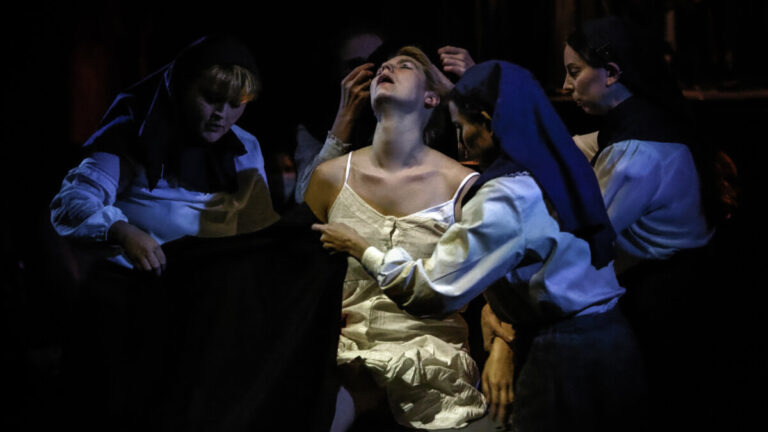It has been an incredible opportunity to stage La Nonne Sanglante for the first time in the UK – and when I first listened to it I couldn’t believe this would be its debut – says Hungarian stage director Franciska Éry.
The music is rich, exciting, romantic and dynamic. Conductor Rosie Howarth lead Leon Haxby’s reduction with a great sense of dramaturgy, making sure the pace is never dropped and keeping the audience on the edge of their seats.
My task was to try and tell this story in a way that it didn’t feel too similar to Tim Burton’s Corpse Bride. Through exploring the theme of photography, which was paramount in the victorian era, the production becomes an exploration of mortality and morality.
From taking post-mortem photos of the dead nun in the overture all the way to nuns developing photographs of her murderer, we see the story unravel, which is part horror, part whodunnit.
Building striking images was the goal here, and using Hoxton Hall in traverse allowed us to maximize space, but also involve the iconic, eerie building in the story we were telling.

Designed by Harry Pizzey and lit by Ali Hunter, we were constantly searching for moments that would surprise the audience, rather than relying on jump-scares. We’d often think “wouldn’t it be cool if the Nun stood there, but her voice came from somewhere else?” or “wouldn’t it be cool if suddenly tables appeared from nowhere?”
Through this, the production became a search for simple magic. Horror on stage is very difficult – but thanks to the team and the fabulous singers, we are now nominated for an OffWestend award for Opera Production and Mae Heydorn (La Nonne) and Jack Roberts (Rodolphe) are nominated for their performances.
From Gothic Opera (Charlotte Osborn, Alice Usher and Béatrice de Larragoïti):
When we founded Gothic Opera in 2019, it was one of our central aims to shed light on rarely-seen operas with spooky, supernatural and gothic themes, which deserved to be known by wider audiences.
La Nonne sanglante fits this ambition perfectly: an opera which, although it had fans including the composer Berlioz, had received only a handful of performances when it was first written, due to its ‘grand opera’ opulence, subject matter that was considered immoral, theatrical politics and the changing tastes of the time.
It had been staged only once in France and once in Germany, and hadn’t been seen in the UK ever before. The story, based on Matthew Gregory Lewis’s The Monk, is both frightening and compelling, and the music is well-written and remarkably catchy, meaning that we knew it would appeal to audiences.

Beatrice de Larragoiti, Gothic Opera’s Artistic Director, says, this project had been a long-term interest and hope she’d nurtured for many years:
„My passion for La Nonne sanglante goes way back to 2015, when I started researching about the concept of gothic and „fear” in music, and more specifically in opera. I was struck by the modernity of this forgotten opera, which is particularly dramatic and action-focused. I am a strong advocate for giving forgotten works a chance to be listened to again, and it is essential for me to put a spotlight on the ‘background pieces’, that also form part of the world of our most admired composers. These works give a better understanding of the operas that passed to posterity, and make us question our conception of what a masterpiece is.”
That the project was so successful is testament to the hard work of our entire team, both those who had been on board from the outset, and those who were more recent arrivals, who caught on to our enthusiasm for this unknown opera and brought their professionalism to making it as good as it could possibly be.
We are very proud of the outcome, which we think was a fitting testament to this remarkable opera. Hoxton Hall is a gorgeous gem of a venue which was a perfect match for the piece, and the audiences emerged speaking of the thrilling atmosphere and gripping storyline, as well as the visual and musical excellence of the production.
We hope our production has opened La Nonne sanglante up to a wider audience, perhaps enabling it to become a better-known part of the repertoire.











